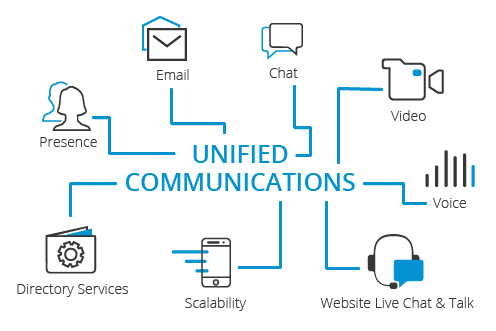If you’re looking for something to improve your company’s communication systems, you’ll often hear two terms in your search: Unified Communications as a Service (UCaaS) and Voice over Internet Protocol (VoIP). UCaaS is a cloud-based model that unifies different business communication tools, such as instant messaging and video conferencing, into a single platform. Meanwhile, VoIP is an internet-powered phone service. And it’s powered by dedicated machines.
But between the two communication systems, which one should you get? Let’s list their pros and cons and arrive at a conclusion.
UCaaS

Image via 3CX
Pros
Range of Services
As mentioned, UCaaS offers an entire suite of applications and services. For example, audio and video conferencing, many UCaaS vendors also offer collaboration services, such as screensharing and real-time document editing. Email systems are also part of UCaaS’ range of services. Then again, if you already have an existing email system, that can be readily integrated by your UCaaS provider.
Centralized Management
One of UCaaS’ biggest advantages is that everything is available on one platform. Not only does this encourage better company-wide collaboration, but it also makes it easy for your IT team to deploy any changes into the system. After all, a unified architecture ensures that you won’t have to release different patches for multiple services, saving you a lot of time.
Scalability
As a service on the cloud, UCaaS services can easily be scaled whenever you need them to. For example, you can upgrade your plan to include more users or better features. If you need to downscale, the opposite is also possible. The latter is extremely useful for sudden instances like the pandemic, where it’s better to allocate your resources to other departments.
Cons
Costs
While UCaaS is not expensive per se, it still adopts a subscription-based model, so it’ll charge you for as long as you use the service. There are also other expenditures to think about when deploying this model, such as hardware endpoints like desk phones and computers, as well as software solutions to integrate like analytics and workforce management tools.
Security Risks
Much like any cloud service, UCaaS faces certain risks. For instance, even though data is encrypted on the cloud, corporate files can still leak through your users (such as through email telephone scams). Employees can also misplace keys and other login details, which third parties can use for their own purpose.
VoIP
Pros
Machine Features
Aside from connecting calls, VoIP phones tout other features such as call recording, international calls, and voicemails. VoIP phones have high-speed PCBs or printed circuit boards, granting them the necessary power to support all the features that VoIP promises. Moreover, since the board uses signals with fast edges, VoIP machines are able to overcome hardware latency issues present in many electronic devices.
Low Costs
Compared to a regular telephone line or a UCaaS service, VoIP services are much cheaper. For example, an average landline phone system can cost businesses up to $50 per line/month. Meanwhile, UCaaS services cost up to $480 per user/year (and, as mentioned, this is just the platform itself—it doesn’t take into account other fees).
And while VoIP lines are already cheaper, research shows that its costs will also decline between 3% and 5% every year.
Cons
Internet Reliant
The clarity of your call via VoIP phones is reliant on the speed and quality of your broadband service. Sometimes, the internet speed itself isn’t even the issue. When internet services and servers upgrade data routes and such, it can cause lags in your connection. The issue is out of your hands, of course, so just be sure to invest in a good provider and continuously monitor your network.
Lack of Location
Because VoIP uses the internet to issue calls, there is no way for callers to pinpoint your location. This could pose issues when you’re calling emergency services, for example. Location is also important for customers and clients to know where your business is based. This will help you attract potential local customers and partners, as because contacting you will be cheaper.
Fortunately, you can always pay your VoIP provider extra to assign a location to your phone number.
So, which one Should I Get?
If you’re looking for a cheaper service, the answer is naturally VoIP. However, for easier scaling, more features, and more streamlined communication channels, the crown easily goes to UCaaS. 3CX is offering such an all-in-one unified solution for your business communication needs. You can even choose to deploy as a hosted PBX service in your private cloud account or let 3CX host it for you.
Plus, did you know that VoIP can be integrated into a UCaaS service, too? If you have the budget, you can certainly avail of VoIP and integrate it into one platform. Read more about Unified Communications here.


